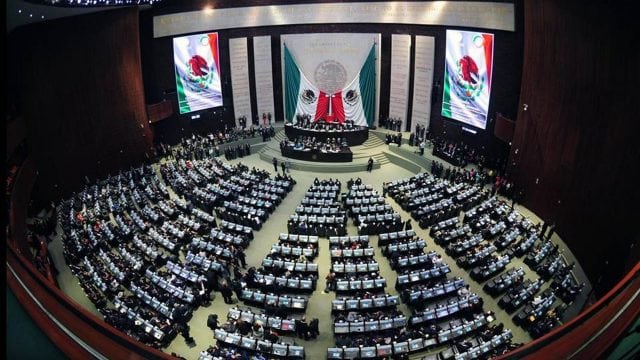Demonstrators in Mexico City blocked entrances to Congress Tuesday to protest a judicial overhaul that would make judges stand for election, a move that critics say would deal a severe blow to the independence of the judiciary and the system of checks and balances.
A mix of court employees, students and other critics chanted and strung ropes across entrances to the lower house of Congress to block legislators from entering. Court employees have also staged strikes in recent weeks.
“The party with the majority could take control of the judicial branch, and that would practically be the end of democracy,” said protester Javier Reyes, a 37-year-old federal court worker.
Despite that, lawmakers from Mexico’s ruling party and their allies appeared determined to push through the reform. Unable to meet at the congressional building, they instead gathered in a sweltering gymnasium about 3 miles (5 kilometers) to begin the voting process.
The constitutional reforms submitted by outgoing president President Andrés Manuel López Obrador’s and his Morena party, have drawn criticism both domestically and from foreign governments and investors.
U.S. Ambassador Ken Salazar said Tuesday that “there is a great deal of concern,” claiming the changes “could damage relations a lot, and it’s not just me saying that.”
Critics say the overhaul would stack the courts in favor of López Obrador’s party, politicize the judicial system and pose a threat to foreign investment. López Obrador, a populist who has long been at odds with the judiciary and other independent regulatory agencies, maintains the proposal is necessary to fight corruption.
Morena and allied lawmakers clustered in groups and fanned their faces as workers laid out grapes, juices and other snacks in a congressional session reminiscent of a summer camp. Outside, a pact of protesters roared, blocking streets and demanding lawmakers hear their objections to the proposal.
Under the current system, judges and court secretaries, who act as judges’ assistants, slowly qualify for higher positions based on their record. But under the proposed changes, any lawyer with minimal qualifications could run, with some candidacies decided by drawing names from a hat.
The ruling Morena party has the two-thirds majority in Congress needed to approve the reforms. The party’s congressional leader, Rep. Ricardo Monreal, said there were no plans to abandon the reforms, noting “This reform is going ahead.”
Mexico’s courts have long been plagued by corruption and opacity, but in the last 15 years they have been subject to reforms to make them more open and accountable, including changing many closed-door, paper-based trials for a more open, oral-argument format.
Voices both at home and abroad say the new changes could mark a setback in the effort to clean up courts.
The proposed changes would cover about 7,000 judges at various levels, and would introduce a time limit for judges to rule on many cases to combat a tendency for some trials to stretch out over decades.
More controversially, the reforms would also introduce “hooded judges” to preside over organized crime cases; their identities would be kept secret in order to prevent reprisals.
And the courts would be largely stripped of their power to block government projects or laws based on appeals by citizens.
López Obrador said last week he has put relations with the United States and Canadian embassies “on pause” after the two countries voiced concerns over the proposed judicial overhaul.
After Morena and its allies won overwhelming majorities in the June 2 elections, López Obrador pledged to push forward with other constitutional changes that would eliminate most independent regulatory and oversight agencies. (AP)





































